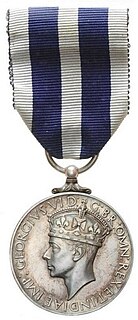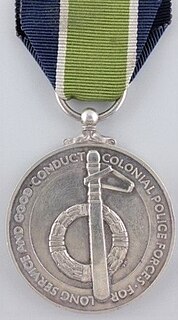
The Distinguished Service Order (DSO) is a military decoration of the United Kingdom, as well as formerly of other parts of the Commonwealth, awarded for meritorious or distinguished service by officers of the armed forces during wartime, typically in actual combat. Since 1993 it has been awarded specifically for 'highly successful command and leadership during active operations', with all ranks being eligible.

The King's Police Medal (KPM) is awarded to police in the United Kingdom for gallantry or distinguished service. It was also formerly awarded within the wider British Empire, including Commonwealth countries, most of which now have their own honours systems. The medal was established on 7 July 1909 as the King's Police Medal (KPM), initially inspired by the need to recognise the gallantry of the police officers involved in the Tottenham Outrage. Renamed the King's Police and Fire Services Medal (KPFSM) in 1940, it was replaced on 19 May 1954 by the Queen's Police Medal (QPM), when a separate Queen's Fire Service Medal was also instituted. After the death of the Queen in 2022, the medals were renamed to King's Police Medal (KPM) and King's Fire Service Medal (KFSM) respectively,

The Tshumelo Ikatelaho - General Service Medal was instituted by the President of the Republic of South Africa on 16 April 2003, and came into effect on 27 April 2003. It can be awarded to all ranks who have participated in military campaigns or operations which, while not warranting the institution of particular campaign medals, still justify the award of a medal for general service. The bilingual title of the medal is in Tshivenda and English
The Royal Victorian Medal (RVM) is a decoration established by Queen Victoria in April 1896. On 14 May 1912, King George V further confirmed the institution of the medal with an additional royal warrant. A part of the Royal Victorian Order, it is a reward for personal service to the Sovereign or the royal family, and is the personal gift of the sovereign. It differs from other grades of the order in appearance and in the way it is worn.

The King's Gallantry Medal (KGM) is a United Kingdom decoration awarded for exemplary acts of bravery where the services were not so outstanding as to merit the George Medal, but above the level required for the King's Commendation for Bravery.

The Medal of the Most Excellent Order of the British Empire for Gallantry, known as the Empire Gallantry Medal (EGM), was a British medal awarded for acts of gallantry. Unlike the then existing Sea Gallantry Medal (SGM) (1854), the Albert Medal (AM) (1866) and the Edward Medal (EM) (1907) which each had two classes with restricted eligibility criteria, the EGM was a single class award with wide eligibility. It was instituted by King George V on 29 December 1922. In July 1937, recipients were granted the right to use the post-nominal letters "EGM". The EGM was superseded in 1940 by the George Cross which was also a single class award with wide eligibility but unlike the low placed EGM on the Order of Wear, the George Cross was listed immediately after the Victoria Cross.

The Efficiency Decoration, post-nominal letters TD for recipients serving in the Territorial Army of the United Kingdom or ED for those serving in the Auxiliary Military Forces, was instituted in 1930 for award to part-time officers after twenty years of service as an efficient and thoroughly capable officer. The decoration superseded the Volunteer Officers' Decoration, the Colonial Auxiliary Forces Officers' Decoration and the Territorial Decoration.

The Efficiency Decoration , post-nominal letters ED, was instituted in 1930 for award to efficient and thoroughly capable part-time officers in the Citizen Force of the Union of South Africa after twenty years of service. The decoration superseded the Colonial Auxiliary Forces Officers' Decoration.

The Colonial Police Long Service Medal was established in 1934 to recognise long service in the police forces of the colonies and overseas territories of the United Kingdom. On 10 April 2012 the medal became known as the Overseas Territories Police Long Service Medal.

The Colonial Prison Service Medal was established on 28 October 1955 as a long service medal of the United Kingdom and the Commonwealth. On 10 April 2012 the medal became known as the Overseas Territories Prison Service Medal, and underwent a minor change in design. This reflected the change in the way Britain's remaining colonies were described, they having been classed as 'Overseas Territories' from 2002.

The Colonial Fire Brigades Long Service Medal, now known as the Overseas Territories Fire Brigades Long Service Medal, was established in 1934 to recognise long service in the fire services of the colonies and overseas territories of the United Kingdom.

In 1895, Queen Victoria authorised Colonial governments to adopt various British military decorations and medals and to award them to their local military forces. The Colony of Natal introduced this system in August 1895 and, in 1897, instituted the Distinguished Conduct Medal (Natal), post-nominal letters DCM.

In May 1895, Queen Victoria authorised Colonial governments to adopt various British military medals and to award them to members of their local permanent military forces. The Cape of Good Hope introduced this system in September 1895 and, in 1896, instituted the Meritorious Service Medal .

In May 1895, Queen Victoria authorised Colonial governments to adopt various British military medals and to award them to members of their local permanent military forces. The Colony of Natal introduced this system in August 1895 and, in 1897, instituted the Meritorious Service Medal (Natal).

In May 1895, Queen Victoria authorised Colonial governments to adopt various British military medals and to award them to their local permanent military forces. The Cape of Good Hope and Colony of Natal instituted their own territorial versions of the Meritorious Service Medal in terms of this authority. These two medals remained in use in the respective territories until after the establishment of the Union of South Africa in 1910.

The Colonial Special Constabulary Medal was established on 1 April 1957 as a volunteer and part-time long service medal of the United Kingdom and the Commonwealth. On 10 April 2012 the medal became known as the Overseas Territories Special Constabulary Medal, and underwent a minor change in design. This reflected the change in the way Britain's remaining colonies were described, they being classed as 'Overseas Territories' from 2002.

A Police Jubilee Medal was awarded to those on duty at Queen Victoria's Golden and Diamond Jubilee celebrations.

A number of new Sierra Leonean medals were instituted in the decade from 1961, when the country gained independence, until 1971, when Sierra Leone was declared a republic.

The Mauritius Police Long Service and Good Conduct Medal was awarded by the Dominion of Mauritius between 1968 and 1992 to members of the Mauritius Police who completed eighteen years service.

The Mauritius Fire Services Long Service and Good Conduct Medal was awarded between 1968 and 1992 by the Dominion of Mauritius to members of local fire services.

















